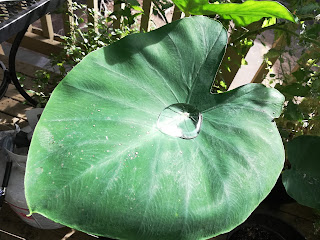"Ask your uncle if you need any oregano. I've got too much over here." I smiled at the neighbor's nephew and waved while holding a few sprigs of the aforementioned herb.
"Ok, I will. It's like you have a whole big garden over there, or something!" He responded with amazement.
As I looked back at all my plants, I understood what he meant. He didn't actually mean a garden. It doesn't take many plants to call something a garden. What he meant was that it was like I have a whole farm on my balcony.
And he's not wrong. My apartment balcony is home to 25 different plants. All of them are edible, with the exception of one. Don't worry - nobody wants to eat my tiny azalea bush. Fruits, vegetables, and herbs transform my balcony into a mini forest, complete with its own pint-sized eco-system.
What we're focusing on today, though, is the herbs.
At first, gardening doesn't seem like a process that would save you money. Seeds sometimes cost more than the produce that you buy in the grocery store. I'm talking about you, Mr. Bell Pepper Seed that only gave me 2 ping ping ball sized fruits!
And buying young plants at a nursery? You can spend less by getting your herbs in bulk at the grocery, depending on the variety.
But!
If you do it right, you become victorious.
Ok, not all of that is herbs. You get the point, though. A small amount can transform your garden into a chef's dream, with perfectly grown spices just waiting to be plucked for your next meal.
How does this save money, you ask? The trick is to choose the right herbs.
Only Plant What You Plan on Using
Yes, I know this seems obvious, but you'd be surprised just how often you go to buy basil, but come out with chives, peppermint, stevia... and basil... in 3 different varieties. It's important to think about what you use. Don't distract yourself with all the other seeds that are calling out to you in their sweet, dulcet tones.
Choose Perennials When Possible
These herbs are the givers of the plant world. Every year you prune then, snip them, constantly remove sprig after sprig, and they keep coming back for more. They're a one-time expense, which means that even if you spend a decent amount of money on one, it'll pay for itself after a season or two.
Only Pick Annuals if Saving Their Seeds is Easy
A good annual for your herb garden is one that enjoys spreading its seeds all over its pot. Plants with this characteristic ensure you have a good supply growing every season.
Most basils are annuals. So are cilantro and dill. The hardest part of caring for these herbs is having the patience to wait for a sprig or two to go to seed.
Growing your own herbs is a small step toward protecting our environment, as well.
How, you ask?
Think about how many miles the herbs you buy in the store have to travel. Most dried (and even fresh) herbs aren't sourced locally. The gas (or diesel) used to get them to your table weighs on the atmosphere, contributing to global warming. That's not all, though.
Consider the packaging. Most of the time, herbs are packaged in plastic containers, or glass containers with plastic lids. I don't think you need to be reminded about the many problems associated with plastic production, or plastic waste.
 |
| ...but I did it, anyway. |
By planting your own herb garden, you not only save money over time, but do your part to save the Earth in the process. What could be better than that?
Plant that garden, and let me know what you plan to put in it. You may give me an idea for expanding mine in the future!





No comments:
Post a Comment